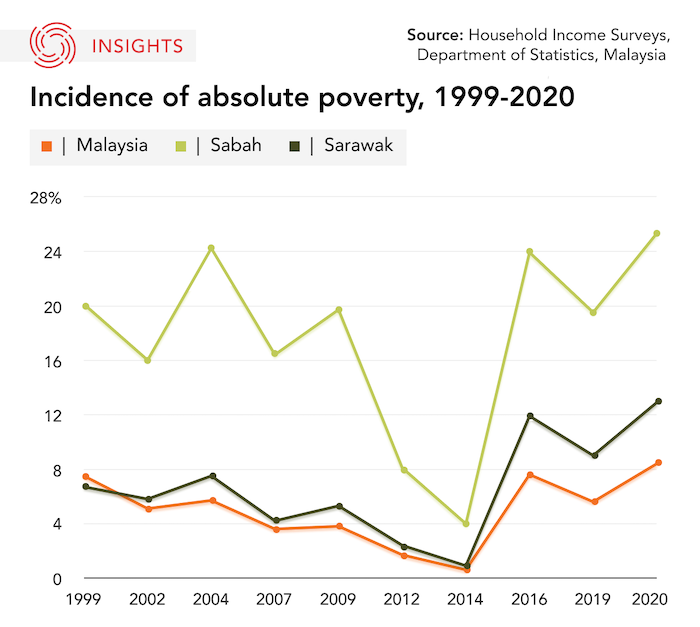The Takeaway
At the Malaysia Agreement 1963 (MA63) Implementation Action Council meeting on January 20, 2023, Prime Minister Anwar Ibrahim announced additional federal funding to upgrade the infrastructure and border security of the states of Sabah and Sarawak, and agreed to increase the annual special grant to both states. The funding, yet to be approved by the federal government, is in line with Anwar’s commitment to the two states’ ruling parties — Gabungan Parti Sarawak (GPS) and Gabungan Rakyat Sabah (GRS) — which are part of his coalition government. Both states have been demanding restoration of their status as equal partners to Peninsular Malaysia per the MA63, the agreement that led to the formation of Malaysia.
In Brief
While chairing the MA63 council meeting, Anwar, who also oversees the finance ministry, said that the federal government has approved in principle a funding boost of C$312 million (1 billion Malaysian ringgits) to upgrade the infrastructure and border security in East Malaysia, the Borneo region of Sabah, and Sarawak to keep up with the anticipated development of Indonesia’s new capital — Nusantara in Kalimantan — which borders the two regions. He also said that in compliance with the provision of special grants for Sabah and Sarawak under Article 112D of the constitution, the federal government has agreed to increase the special grants, which will be reviewed every five years. Subject to the finalization of the formula for the percentage increase of the grant, Sabah and Sarawak are poised to receive C$81.6 million (260 million ringgits) and C$94.2 million (300 million ringgits), respectively, as special grants. Additionally, Anwar also fulfilled Sarawak’s request to appoint Sarawak’s financial secretary, Datuk Seri Dr Wan Lizozman Wan Omar, as one of the board directors of the Inland Revenue Board (IRB).
Implications
Following a turbulent election that led to a hung parliament, GPS and GRS, together accounting for 29 seats in parliament, formed a coalition government with Anwar’s Pakatan Harapan, instead of Barisan Nasional, and entrusted Anwar to lead the country. Anwar’s announcement was in line with his promise to Sabah and Sarawak during his campaign, stating that he would act on restoring the two regions’ status and rights per the MA63.
Sabah and Sarawak have long fought for the restoration of their rights as equal partners of Peninsular Malaysia guaranteed under the MA63, the significance of which has eroded over time. This has undermined the two regions’ rights and privileges, including a reduction in royalties from oil and gas extraction, violation of local Indigenous communities' rights, and limited autonomy over their sovereign borders, language, religion, and education. Consequently, the region suffered from low economic development and high poverty rates, in contrast to the flourishing Peninsula. In 2021, Sabah's GDP growth was 1.1 per cent, while Sarawak’s came in at 2.9 per cent, both lower than the national rate of 3.1 per cent. Poverty rates were also the highest in the regions in 2020, with Sabah leading at 25.3 per cent, and Sarawak in the third spot at 12.9 per cent.
Anwar’s swift decisions pertaining to the implementation of the MA63 (and enhanced infrastructure for the region alongside Nusantara’s development) indicates that Sabah and Sarawak may soon regain their diminished autonomy and see increased economic development.

What's Next
- Full implementation of the MA63
Opposition bloc parties in Sarawak have criticized Anwar for not doing enough to ensure complete implementation of the MA63. Per the agreement, Sarawak had autonomy over its education, health, and land transportation, but over time, the federal government took control of these policy areas. Anwar’s promise to restore the region’s “equal partner” status will be tested by the complete implementation of the MA63, a challenge to overcome in an ethnically divided coalition government.
- Political instability in Sabah
In early January 2023, political infighting led to the collapse of Sabah’s coalition government and the ousting of its chief minister, Hajiji Noor. But with the immediate support of Anwar, Hajiji Noor’s GRS coalition managed to regain their majority and form a new, stable government. It’s unclear how long the new government will stay put, and it’s plausible that another defection could occur, which could derail the progress made by the federal government and Sabah in implementing the MA63.
• Produced by CAST’s Southeast Asia team: Stephanie Lee (Program Manager); Alberto Iskandar (Analyst); Saima Islam (Analyst); and Tim Siao (Analyst).
